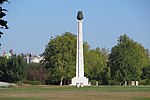Eternal Flame (Belgrade)
2000 establishments in SerbiaBuildings and structures completed in 2000Buildings and structures in BelgradeCulture in BelgradeEternal flames ... and 6 more
Instances of Lang-sr using second unnamed parameterMonuments and memorials in SerbiaNATO intervention in the former YugoslaviaNew BelgradeTourist attractions in BelgradeVandalized works of art

The Eternal Flame (Serbian: Вечна ватра, romanized: Večna vatra) is a memorial in the Park of Friendship in Belgrade, Serbia. It is dedicated to the military and civilian casualties resulting from the NATO bombing of Yugoslavia in 1999 and symbolizes the resistance of the Serbian nation to the attack.The memorial was unveiled on 12 June 2000, commemorating the first anniversary of the end of the bombing. It was vandalized following the overthrow of Slobodan Milošević in October 2000 and was left to the elements until its partial renovation in 2019, but the flame remained extinguished.
Excerpt from the Wikipedia article Eternal Flame (Belgrade) (License: CC BY-SA 3.0, Authors, Images).Eternal Flame (Belgrade)
Peace Avenue, Belgrade New Belgrade (New Belgrade Urban Municipality)
Geographical coordinates (GPS) Address External links Nearby Places Show on map
Geographical coordinates (GPS)
| Latitude | Longitude |
|---|---|
| N 44.8203346 ° | E 20.4349978 ° |
Address
Вечна ватра
Peace Avenue
11000 Belgrade, New Belgrade (New Belgrade Urban Municipality)
Central Serbia, Serbia
Open on Google Maps









